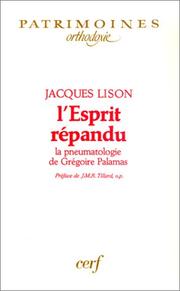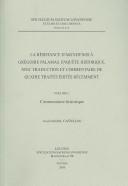| Listing 1 - 10 of 15 | << page >> |
Sort by
|
Book
ISBN: 9788810541357 8810541359 Year: 2010 Volume: 17 Publisher: Bologna EDB
Abstract | Keywords | Export | Availability | Bookmark
 Loading...
Loading...Choose an application
- Reference Manager
- EndNote
- RefWorks (Direct export to RefWorks)
Book
ISBN: 9782204116831 2204116831 Year: 2017 Publisher: Paris Les éditions du Cerf
Abstract | Keywords | Export | Availability | Bookmark
 Loading...
Loading...Choose an application
- Reference Manager
- EndNote
- RefWorks (Direct export to RefWorks)
Les deux Traités démonstratifs sur la procession du Saint-Esprit sont les premières œuvres théologiques de saint Grégoire Palamas (1296-1359).Écrits à l'occasion des discussions gréco-latines qui venaient de se tenir à Constantinople et qui risquaient de déboucher sur un mauvais compromis doctrinal, ils sont dirigés contre le "Filioque" ajouté par l'Église latine au Credo ou Confession de foi. L'affirmation que l'Esprit procède du Père et du Fils impliquant, selon l'Église orthodoxe dont Palamas est l'un des plus éminents théologiens, une conception fausse des trois personnes divines, de leur nature, comme de leurs relations.Tout en réfutant les développements de la théologie latine sur ce point, ces traités constituent l'un des exposés les plus approfondis et les plus fins de la théologie trinitaire orthodoxe, et sont un document essentiel dans le débat entre l'Église orthodoxe et l'Église catholique sur ce qui a été et reste encore une "pierre d'achoppement" sur la voie de leur unité.

ISBN: 2204049360 9782204049368 Year: 1994 Publisher: Paris: Les Éditions du Cerf,
Abstract | Keywords | Export | Availability | Bookmark
 Loading...
Loading...Choose an application
- Reference Manager
- EndNote
- RefWorks (Direct export to RefWorks)
Book
ISBN: 9782503589411 2503589413 9782503589428 Year: 2020 Publisher: Turnhout Brepols
Abstract | Keywords | Export | Availability | Bookmark
 Loading...
Loading...Choose an application
- Reference Manager
- EndNote
- RefWorks (Direct export to RefWorks)
How are we to regard our body? As a prison, an enemy, or, maybe, an ally? Is it something bad that needs to be humiliated and extinguished, or should one see it as a huge blessing, that deserves attention and care? Is the body an impediment to human experience of God? Or, rather, does the body have a crucial role in this very experience? Alexandros Chouliaras’ book The Anthropology of St Gregory Palamas: the Image of God, the Spiritual Senses, and the Human Body argues that the fourteenth-century monk, theologian, and bishop Gregory Palamas has interesting and persuasive answers to offer to all these questions, and that his anthropology has a great deal to offer to Christian life and theology today. Amongst this book’s contributions are these: for Palamas, the human is superior to the angels concerning the image of God for specific reasons, all linked to his corporeality. Secondly, the spiritual senses refer not only to the soul, but also to the body. However, in Paradise the body will be absorbed by the spirit, and acquire a totally spiritual aspect. But this does not at all entail a devaluing of the body. On the contrary, St Gregory ascribes a high value to the human body. Finally, central to Palamas’ theology is a strong emphasis on the human potentiality for union with God, theosis: that is, the passage from image to likeness. And herein lies, perhaps, his most important gift to the anthropological concerns of our epoch.
Book
ISBN: 9782204095372 2204095370 Year: 2012 Volume: 9 Publisher: Paris Cerf
Abstract | Keywords | Export | Availability | Bookmark
 Loading...
Loading...Choose an application
- Reference Manager
- EndNote
- RefWorks (Direct export to RefWorks)

ISBN: 9042911654 9042911662 9789042911659 9789042911666 Year: 2006 Volume: 50-51 Publisher: Leuven: Spicilegium sacrum Lovaniense, Peeters,
Abstract | Keywords | Export | Availability | Bookmark
 Loading...
Loading...Choose an application
- Reference Manager
- EndNote
- RefWorks (Direct export to RefWorks)
Hesychasm --- Akindynos, Gregorios, --- Gregory Palamas, --- Barlaam Calabro, --- 2 GREGORIUS PALAMAS --- Godsdienst. Theologie--GREGORIUS PALAMAS --- 2 GREGORIUS PALAMAS Godsdienst. Theologie--GREGORIUS PALAMAS --- Akindynos --- Gregorius Palamas ep. Thessalonic. --- Akindynos, Gregorios, - approximately 1300-approximately 1349. - Refutatio magna --- Gregory Palamas, - Saint, - 1296-1359. - Dialogus inter Orthodoxum et Barlaamitam --- Barlaam Calabro, - approximately 1290-1348
Book
ISBN: 8845292347 9788845292347 Year: 2003 Publisher: Milano Bompiani
Abstract | Keywords | Export | Availability | Bookmark
 Loading...
Loading...Choose an application
- Reference Manager
- EndNote
- RefWorks (Direct export to RefWorks)
2 GREGORIUS PALAMAS --- Godsdienst. Theologie--GREGORIUS PALAMAS --- Theology, Doctrinal --- Hesychasm --- Christian saints --- Christian saints. --- Hesychasm. --- Theology, Doctrinal. --- Gregory Palamas, --- Orthodox Eastern Church --- Orthodox Eastern Church. --- Doctrines --- Greece --- 2 GREGORIUS PALAMAS Godsdienst. Theologie--GREGORIUS PALAMAS --- Mysticism --- Saints --- Canonization --- Grégoire Palamas, --- Gregor Palamas, --- Gregorio Palamas, --- Grēgorios, --- Gregorios Palamas, --- Grigorie Palama, --- Grigoriĭ Palama, --- Palamas, Gregorius, --- Palamas, Gregory,
Dissertation
ISBN: 9188348288 Year: 2002 Publisher: Göteborg Göteborgs universitet. Institutionen för religionsvetenskap
Abstract | Keywords | Export | Availability | Bookmark
 Loading...
Loading...Choose an application
- Reference Manager
- EndNote
- RefWorks (Direct export to RefWorks)
2 GREGORIUS PALAMAS --- Godsdienst. Theologie--GREGORIUS PALAMAS --- Theses --- Hesychasm. --- Hesychasme. --- Kloosterwezen. --- 2 GREGORIUS PALAMAS Godsdienst. Theologie--GREGORIUS PALAMAS --- Hesychasm --- Mysticism --- Orthodox Eastern Church --- Barlaam Calabro, --- Gregory Palamas, --- Grégoire Palamas, --- Gregor Palamas, --- Gregorio Palamas, --- Grēgorios, --- Gregorios Palamas, --- Grigorie Palama, --- Grigoriĭ Palama, --- Palamas, Gregorius, --- Palamas, Gregory, --- Barlaam, --- Varlaam,
Book
ISBN: 9789042935921 9042935928 Year: 2017 Publisher: Leuven ; Paris ; Bristol, CT Peeters
Abstract | Keywords | Export | Availability | Bookmark
 Loading...
Loading...Choose an application
- Reference Manager
- EndNote
- RefWorks (Direct export to RefWorks)
276 <063> --- 2 GREGORIUS PALAMAS --- 276 <063> Patrologie. Patristiek--Congressen --- 276 <063> Patrologie. Patristique--Congressen --- Patrologie. Patristiek--Congressen --- Patrologie. Patristique--Congressen --- 2 GREGORIUS PALAMAS Godsdienst. Theologie--GREGORIUS PALAMAS --- Godsdienst. Theologie--GREGORIUS PALAMAS --- Conferences - Meetings --- Authorship. --- Christian literature, Early --- Christian literature, Early. --- Christology. --- History and criticism --- Gregory Palamas, --- Jesus Christ --- Jesus Christ. --- Written works --- Person and offices.
Book
ISBN: 9782204116855 2204116858 Year: 2021 Publisher: Paris Les Éditions du Cerf
Abstract | Keywords | Export | Availability | Bookmark
 Loading...
Loading...Choose an application
- Reference Manager
- EndNote
- RefWorks (Direct export to RefWorks)
Les Cent cinquante chapitres constituent une exception dans l’oeuvre de saint Grégoire Palamas :ils nous proposent une véritable synthèse de sa théologie. L’oeuvre comporte deux parties. D’une part, la création de l’univers et de l’homme, véritable « sortie » de Dieu hors de lui-même par amour des êtres créés. Et d’autre part, le retour de l’homme vers Dieu par sa participation à la grâce divine incréée.Dans ce texte, saint Grégoire défend la position de l’Église depuis les origines. Sa théologie lumineuse répond au plan de Dieu et à la vocation de l’homme appelé à devenir « participant à la nature divine » (2 Pierre 1, 4).
God (Christianity) --- Knowledge, Theory of (Religion) --- Creation --- Theological anthropology --- Epistemology, Religious --- Religious epistemology --- Religious knowledge, Theory of --- Religion --- Theology, Doctrinal --- Christianity --- Trinity --- Knowableness --- Philosophy --- Orthodox Eastern Church --- Doctrines. --- 2 GREGORIUS PALAMAS --- 2 GREGORIUS PALAMAS Godsdienst. Theologie--GREGORIUS PALAMAS --- Godsdienst. Theologie--GREGORIUS PALAMAS --- Doctrines
| Listing 1 - 10 of 15 | << page >> |
Sort by
|

 Search
Search Feedback
Feedback About UniCat
About UniCat  Help
Help News
News